-
 Bitcoin
Bitcoin $117300
1.99% -
 Ethereum
Ethereum $3884
5.89% -
 XRP
XRP $3.268
9.33% -
 Tether USDt
Tether USDt $1.000
0.02% -
 BNB
BNB $783.0
1.78% -
 Solana
Solana $173.6
3.51% -
 USDC
USDC $0.9999
0.00% -
 Dogecoin
Dogecoin $0.2193
7.00% -
 TRON
TRON $0.3380
0.30% -
 Cardano
Cardano $0.7769
5.08% -
 Stellar
Stellar $0.4350
9.36% -
 Hyperliquid
Hyperliquid $40.23
5.78% -
 Sui
Sui $3.739
6.95% -
 Chainlink
Chainlink $18.30
9.46% -
 Bitcoin Cash
Bitcoin Cash $581.7
2.11% -
 Hedera
Hedera $0.2577
5.51% -
 Ethena USDe
Ethena USDe $1.001
0.00% -
 Avalanche
Avalanche $23.08
4.23% -
 Litecoin
Litecoin $121.7
2.24% -
 UNUS SED LEO
UNUS SED LEO $8.962
-0.34% -
 Toncoin
Toncoin $3.332
1.36% -
 Shiba Inu
Shiba Inu $0.00001273
3.39% -
 Uniswap
Uniswap $10.35
6.84% -
 Polkadot
Polkadot $3.818
4.01% -
 Dai
Dai $1.000
0.01% -
 Bitget Token
Bitget Token $4.446
2.13% -
 Cronos
Cronos $0.1491
4.96% -
 Monero
Monero $255.4
-9.78% -
 Pepe
Pepe $0.00001099
4.80% -
 Aave
Aave $284.0
8.01%
Which blockchain apps are most active in the Chinese community?
Despite Chinese regulations, blockchain apps thrive, with WeChat facilitating community building and engagement indirectly measured via group activity and online forums. Privacy concerns and regulatory uncertainty heavily influence app choices.
Mar 10, 2025 at 06:15 pm
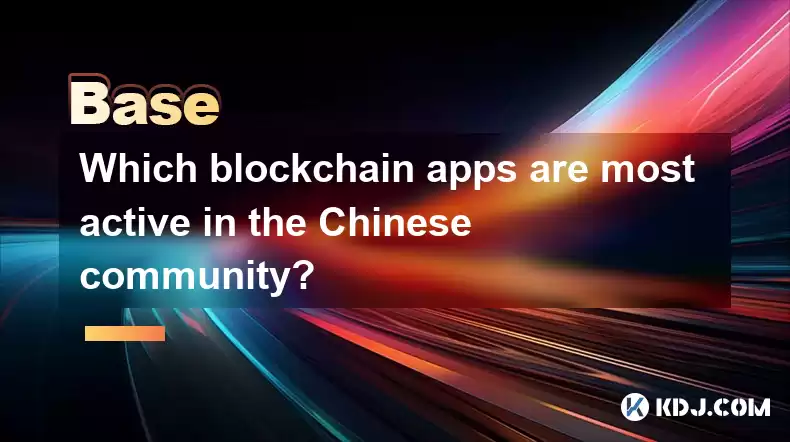
Key Points:
- Several blockchain applications have gained significant traction within the Chinese cryptocurrency community, despite regulatory challenges.
- WeChat, despite not being a blockchain app itself, plays a crucial role in facilitating communication and community building around these apps.
- The activity level is often measured indirectly through community engagement on platforms like WeChat groups, forums, and social media.
- Privacy concerns and regulatory uncertainty influence the choice and usage of blockchain apps within the community.
- Understanding the Chinese regulatory landscape is crucial to comprehending the dynamics of blockchain app usage.
Which Blockchain Apps are Most Active in the Chinese Community?
The Chinese cryptocurrency community, despite facing regulatory hurdles, remains a significant force in the global blockchain landscape. Identifying the most active apps is challenging due to the decentralized nature of blockchain and the limitations on openly tracking usage within China. However, certain applications demonstrate strong community engagement within the country. The activity isn't always directly measurable through official download numbers or transaction volumes, but rather through indirect indicators like WeChat group activity and online forum discussions.
One indirect measure of popularity is the presence and activity level within various WeChat groups dedicated to specific blockchain projects. Many projects cultivate strong communities through these channels, sharing news, discussing developments, and offering support. The sheer number of members and the frequency of posts within these groups can be a good indicator of community engagement. However, this data is difficult to obtain systematically and objectively.
While many international blockchain apps have a Chinese-speaking user base, their level of activity within China itself can be significantly affected by regulatory factors. The Chinese government's stance on cryptocurrencies has led to restrictions on various aspects of blockchain technology, impacting user adoption and community engagement. This creates a complex interplay between the global popularity of an app and its actual usage within the Chinese community.
Privacy-focused applications tend to see higher engagement within China, where concerns about data privacy are prominent. Users often gravitate towards apps that offer enhanced anonymity and security features, mitigating some of the risks associated with increased government scrutiny. This demand for privacy drives the adoption of certain blockchain projects over others.
Many projects use WeChat as a primary communication tool, making it a vital component of the ecosystem. WeChat groups often serve as a central hub for discussions, announcements, and community management. While not a blockchain app itself, WeChat's role in facilitating communication cannot be overstated when assessing the popularity of blockchain apps within the Chinese community.
Some blockchain projects have successfully adapted to the Chinese regulatory environment by focusing on permissioned blockchain solutions or focusing on applications with less direct involvement in cryptocurrencies. These applications often find a niche within the Chinese market by offering services that comply with existing regulations while still leveraging blockchain technology. The success of these applications showcases the adaptability of blockchain within a restrictive regulatory framework.
The difficulty in definitively ranking blockchain apps by activity within the Chinese community stems from several factors. These include the lack of readily available, comprehensive data, the prevalence of unofficial communication channels, and the impact of regulatory uncertainties. Furthermore, the ever-evolving nature of the cryptocurrency market means that rankings can shift rapidly.
Here's a breakdown of some potential indicators used to gauge activity:
- WeChat Group Size and Activity: Large and active WeChat groups dedicated to a specific blockchain project suggest strong community engagement.
- Forum Participation: High levels of participation on Chinese forums and online communities related to blockchain technology can indicate significant interest in a particular app.
- Social Media Mentions: Tracking mentions and discussions on Chinese social media platforms (like Weibo) can provide insights into community sentiment and usage.
- Developer Activity: Active development and updates to a blockchain app tailored to the Chinese market are a sign of ongoing engagement and relevance.
However, these methods are not perfect and often provide a partial picture of the actual usage within China.
The regulatory environment plays a significant role in shaping the Chinese blockchain app landscape. Understanding the current regulations and their potential impact on various applications is crucial to interpreting observed levels of activity within the community. The constant evolution of these regulations also introduces uncertainty into any assessment of app popularity.
Frequently Asked Questions:
Q: Are there any specific blockchain apps popular in China that are not widely known internationally?
A: Due to regulatory restrictions and the decentralized nature of many projects, it's difficult to definitively identify apps popular only within China. Many projects might operate with a low international profile but significant domestic use. Information about these projects is often found within Chinese-language online communities and is not easily accessible to those outside the Chinese-speaking world.
Q: How does the Chinese government's stance on cryptocurrencies affect the popularity of blockchain apps?
A: The Chinese government's negative stance on cryptocurrencies significantly impacts the popularity and adoption of blockchain apps. Strict regulations limit the use of cryptocurrencies for transactions and trading, indirectly affecting the demand for blockchain apps that directly facilitate these activities. However, this doesn't eliminate the use of blockchain technology altogether; it simply shifts the focus towards applications that are less directly involved in cryptocurrency transactions, such as supply chain management or data security solutions.
Q: What role does WeChat play in the Chinese blockchain community?
A: WeChat plays a crucial role, serving as a primary communication platform for many blockchain projects and communities in China. WeChat groups provide a centralized space for news sharing, discussions, and community building. Its widespread usage within China makes it an essential tool for connecting individuals and fostering engagement within the blockchain ecosystem. It's important to note that WeChat itself is not a blockchain application, but it acts as a vital supporting infrastructure for the community.
Q: How can I find information about the activity of blockchain apps within the Chinese community?
A: Finding reliable information requires accessing Chinese-language online communities, forums, and social media platforms. Monitoring WeChat groups dedicated to specific blockchain projects can offer insights into community engagement levels. However, gathering comprehensive data is challenging due to the decentralized nature of these communities and the language barrier.
Disclaimer:info@kdj.com
The information provided is not trading advice. kdj.com does not assume any responsibility for any investments made based on the information provided in this article. Cryptocurrencies are highly volatile and it is highly recommended that you invest with caution after thorough research!
If you believe that the content used on this website infringes your copyright, please contact us immediately (info@kdj.com) and we will delete it promptly.
- Cold Wallet Crypto in 2025: The Future is Now, Ya'll
- 2025-08-08 05:10:13
- MAGACOIN, SOL, and ADA: A Tale of Shifting Tides in Crypto
- 2025-08-08 05:10:13
- SHIB Price, PEPE, and the Memecoin Supercycle: Who Will Reign Supreme?
- 2025-08-08 05:50:12
- Pudgy Penguins Price Prediction: Google Trends & Breakout Signals
- 2025-08-08 05:50:12
- UAE Crypto Regulation: SCA and VARA Unite to Streamline the Future of Digital Assets
- 2025-08-08 05:55:48
- MAGACOIN Finance: The Presale Phenomenon Rocking the Crypto World
- 2025-08-08 05:55:48
Related knowledge
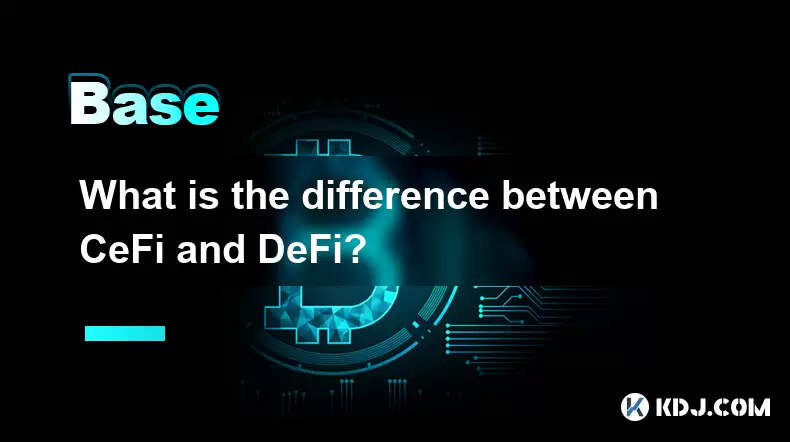
What is the difference between CeFi and DeFi?
Jul 22,2025 at 12:28am
Understanding CeFi and DeFiIn the world of cryptocurrency, CeFi (Centralized Finance) and DeFi (Decentralized Finance) represent two distinct financia...
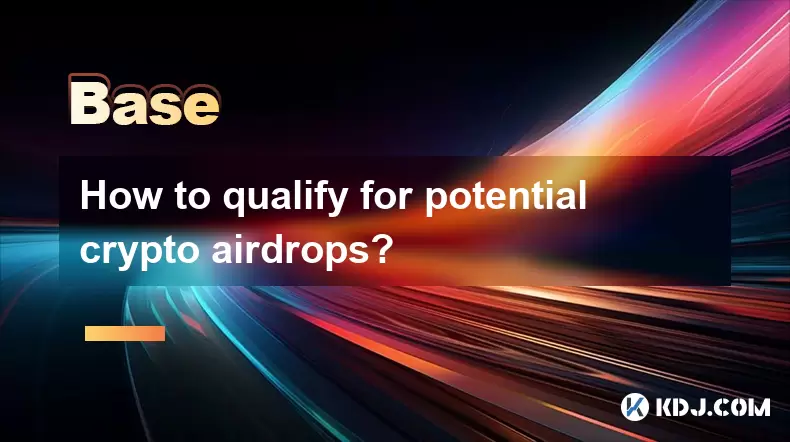
How to qualify for potential crypto airdrops?
Jul 23,2025 at 06:49am
Understanding What Crypto Airdrops AreCrypto airdrops refer to the distribution of free tokens or coins to a large number of wallet addresses, often u...
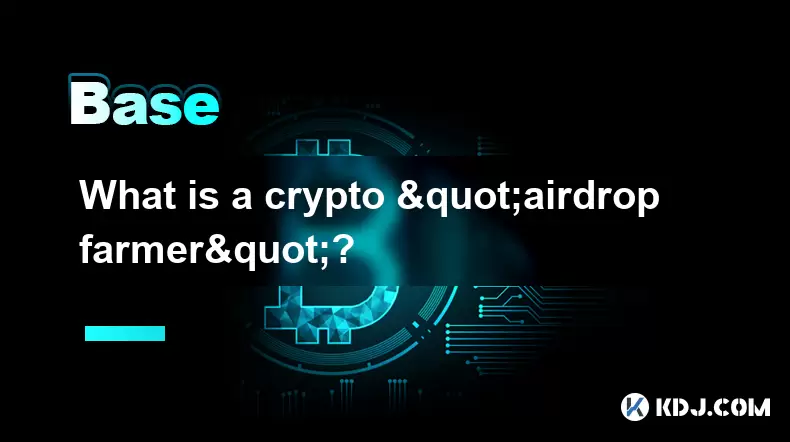
What is a crypto "airdrop farmer"?
Jul 24,2025 at 10:22pm
Understanding the Role of a Crypto 'Airdrop Farmer'A crypto 'airdrop farmer' refers to an individual who actively participates in cryptocurrency airdr...
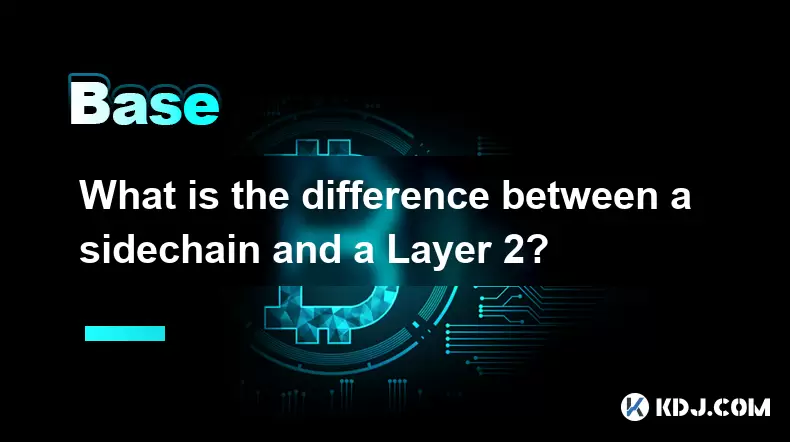
What is the difference between a sidechain and a Layer 2?
Jul 20,2025 at 11:35pm
Understanding the Concept of SidechainsA sidechain is a separate blockchain that runs parallel to the main blockchain, typically the mainnet of a cryp...
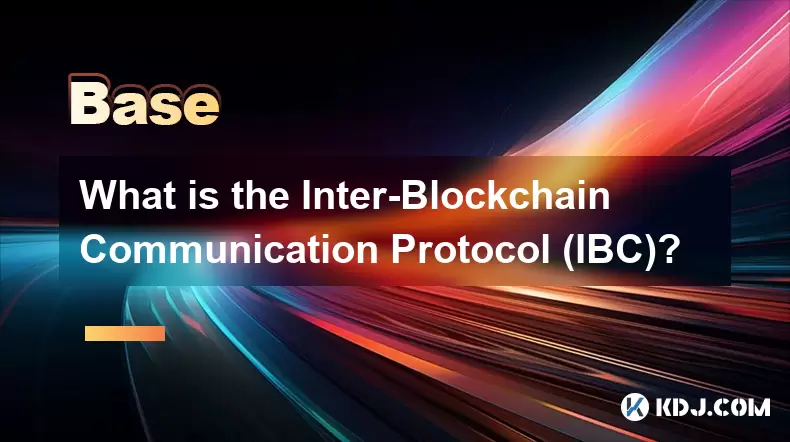
What is the Inter-Blockchain Communication Protocol (IBC)?
Jul 19,2025 at 10:43am
Understanding the Inter-Blockchain Communication Protocol (IBC)The Inter-Blockchain Communication Protocol (IBC) is a cross-chain communication protoc...
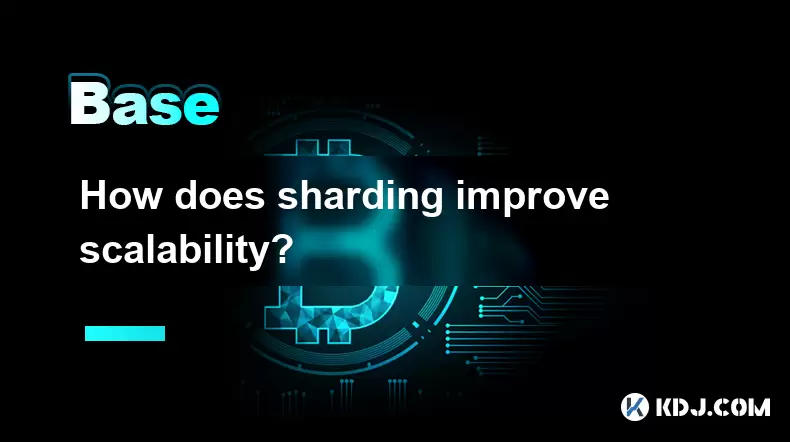
How does sharding improve scalability?
Jul 20,2025 at 01:21am
Understanding Sharding in BlockchainSharding is a database partitioning technique that is increasingly being adopted in blockchain technology to enhan...

What is the difference between CeFi and DeFi?
Jul 22,2025 at 12:28am
Understanding CeFi and DeFiIn the world of cryptocurrency, CeFi (Centralized Finance) and DeFi (Decentralized Finance) represent two distinct financia...

How to qualify for potential crypto airdrops?
Jul 23,2025 at 06:49am
Understanding What Crypto Airdrops AreCrypto airdrops refer to the distribution of free tokens or coins to a large number of wallet addresses, often u...

What is a crypto "airdrop farmer"?
Jul 24,2025 at 10:22pm
Understanding the Role of a Crypto 'Airdrop Farmer'A crypto 'airdrop farmer' refers to an individual who actively participates in cryptocurrency airdr...

What is the difference between a sidechain and a Layer 2?
Jul 20,2025 at 11:35pm
Understanding the Concept of SidechainsA sidechain is a separate blockchain that runs parallel to the main blockchain, typically the mainnet of a cryp...

What is the Inter-Blockchain Communication Protocol (IBC)?
Jul 19,2025 at 10:43am
Understanding the Inter-Blockchain Communication Protocol (IBC)The Inter-Blockchain Communication Protocol (IBC) is a cross-chain communication protoc...

How does sharding improve scalability?
Jul 20,2025 at 01:21am
Understanding Sharding in BlockchainSharding is a database partitioning technique that is increasingly being adopted in blockchain technology to enhan...
See all articles

























































































